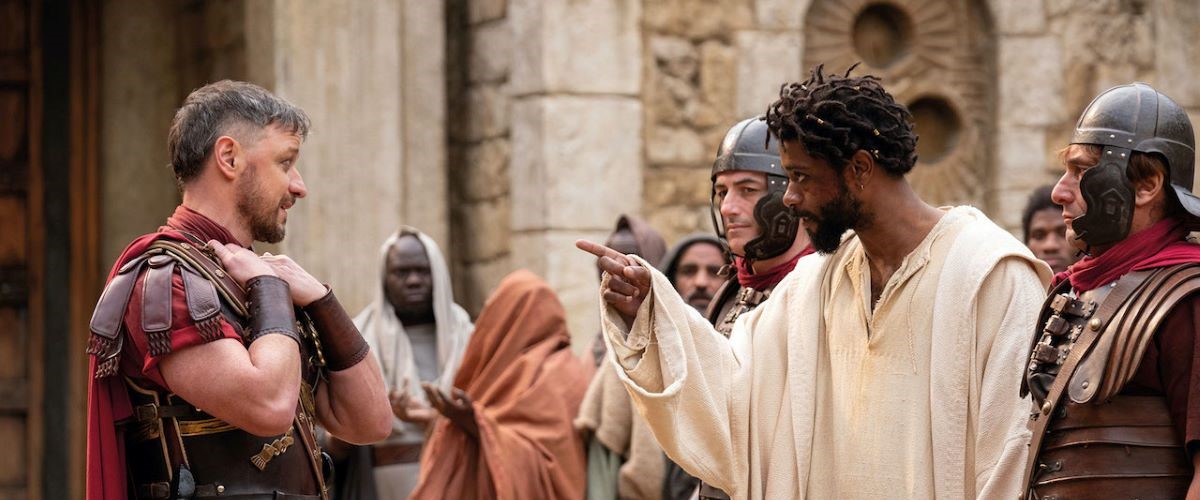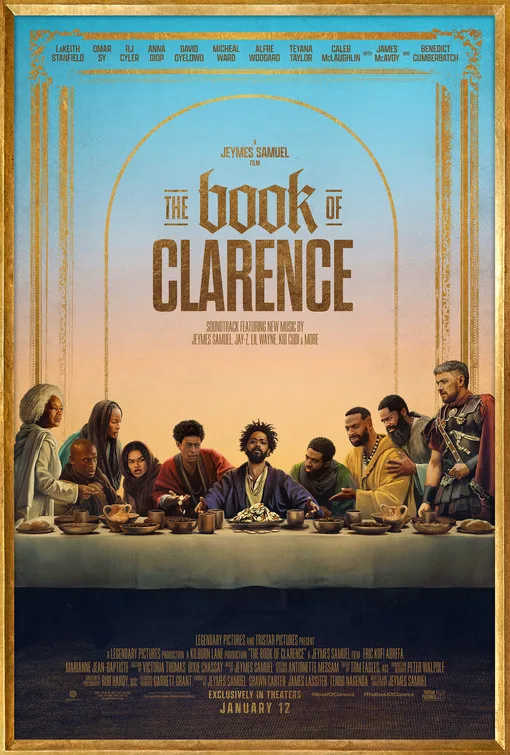“The Book of Clarence,” the religious epic by multi-hyphenate talent Jeymes Samuel, is a handsomely crafted picture that simply loses the plot. Built around Clarence (LaKeith Stanfield), a street hustler living in A.D. 33 Jerusalem, Samuel’s script is a farcical exploitation flick forcibly reaching for political relevance under the misbegotten expectation that every Black film must be important. As evidenced in Samuel’s directorial debut, “The Harder They Fall,” the filmmaker has an exacting vision, but there’s a fine line between subverting the genre and rendering it incomprehensible.
“The Book of Clarence” is a religious epic that isn’t particularly religious: Despite Clarence’s twin brother Thomas (also played by Stanfield) being one of Jesus’ apostles, Clarence is a cynical atheist. He is also a drug dealer, selling and smoking a copious amount of weed. Club dens with nearly nude, sensually gyrating women and shady characters fill his world.
Clarence also isn’t the brightest light in Jerusalem. Take the film’s opening scene: To make some extra cash, Clarence borrows money from a notorious gangster named Jedediah the Terrible (Eric Kofi-Abrefa) for a chariot race against Mary Magdalene (Teyana Taylor). It’s not quite clear why Clarence thinks this a safe bet or even a lucrative opportunity, especially considering the risk involved. Still, Clarence and Mary’s contest, shot on location (Matera, Italy is the real-world stand-in for Jerusalem), is surprisingly immersive and refreshingly practical. In a scene dearly indebted to “Ben Hur,” their chariots, pulled by real horses, thunder down old-world streets with precision. Rob Hardy’s cinematography is so tangible in this sequence, aided by point of view shots from within the carriage, you can feel the wheels rumbling underneath.
Clarence and his best friend Elijah (RJ Cyler), of course, lose terribly to Mary. Their defeat means they need to find a way to scrape together enough cash to pay back Jedediah. At first, Clarence considers being baptized, believing God will protect him. It’s an idea so vain that John the Baptist (an inspired David Oyelowo) hilariously slaps him. Then Clarence decides to become an apostle, believing that Jesus’ gang of made-men, so to speak, will protect him. Even that strategy has a few problems: Clarence, as you recall, is an atheist; he is also estranged from his brother Thomas, who not only abandoned their mother (Marianne Jean-Baptiste) but is also embarrassed by Clarence’s presence; also, when given the chance, Clarence fails at the task provided by the other disciples when he only manages to free one gladiatorial slave, Barabbas (a captivating Omar Sy).
These failed hustles are laboriously paced by the film’s misplaced humor, which only becomes creakier when Clarence decides to get-rich-quick by posing as a new messiah. This lightbulb moment—seriously, an actual lightbulb appears over Clarence’s head—happens nearly halfway through the film. From that point on, you wonder exactly who is the audience for this movie. See, Clarence doesn’t believe in the immaculate conception or that Jesus performs actual miracles. He thinks Jesus has become famous by crafting elaborate tricks. The film therefore tries to walk the very thin line between lampooning Christianity and setting Clarence on a journey of self-discovery. The more it attempts one, the greater the other suffers—leading to excruciating jokes that rarely, if ever, rise above a slight chuckle.
Though its slickness—exemplified by the tactile costumes (worn robes and inventive uses of gold) and delicately balanced, yet expansive wide-angle shots, is the film’s primary inviting feature, “The Book of Clarence” is hampered by Samuel’s unbridled creativity. Similar to “The Harder They Fall,” the filmmaker composed his film’s soundtrack. While some songs set a discerning, post-soul mood, sequences slowed to the speed of molasses exist to showcase the music more than push the narrative forward. The script’s already broad scope leaves other components—such as the romance shared by Clarence and Jebediah’s sister (Anna Diop) or the fraught dynamic between Judas (Michael Ward) and Jesus—as ill-defined glitches as well. And yet, no portion of the film is more undercooked than when Pontius Pilate (James McAvoy) and the Roman Empire target Clarence. Samuel simply paints the Romans as a stand-in for white supremacy without any further complexity or argument, making for a head-scratching political statement without a thesis.
None of this is helped by Stanfield being misaligned from the material. Considering his many years on “Atlanta,” you’d think a smartly cynical dark comedy would be perfect. But he often plays the punchlines either with indifference or a seriousness that undercuts the intended tone. With that in mind, it’s worth remembering that whenever an actor whiffs this badly, it’s rarely, if ever, wholly on the performer. Rather Samuel asks too much of his lead. He expects Stanfield to hold together the narrative’s disparate moods, the visual gags, the metaphysical questions being posed, the stilted dialogue meant to mirror Biblical verse, while landing a gruesome finale that most audiences will probably be ill-prepared to accept.
By the end, you’re left wondering why Samuel wanted to make a film about religious conversion, itself a desire historically defined by suppression and erasure. Isn’t Black liberation about Black people possessing the kind of freedom of thought that allows Blackness not to be monolithic? If so, then Samuel’s film would have been better offer mining those complexities rather than diminishing them.




















